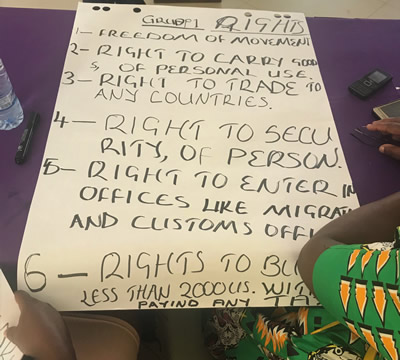"Borderline" project equips women with information on trade procedures, helping them reduce business costs and expand opportunities.

Women engaging in informal cross-border trade often lack access to information on trade rules and customs procedures and suffer from weak entrepreneurial capacity.
As a result, they use informal crossing paths that may expose them to violence, harassment, bribes, high fines and confiscation of their merchandise if caught by border authorities.
Their businesses remain a subsistence activity, leaving them unable to transition to profitable and sustainable ones.
UNCTAD’s project dubbed “Borderline” that is being implemented in six border districts of Malawi, Tanzania and Zambia is helping the women overcome these challenges.
Getting it right
Under the project, UNCTAD has trained 150 women on how to conduct their businesses the right way.
The training sessions delivered in close collaboration with border agencies comprised two components: one-day border sessions on cross-border trade rules, traders’ rights and obligations and potential benefits of business formalization; and five-day training sessions on the development of entrepreneurial skills based on the Empretec methodology.
Empretec is UNCTAD’s flagship capacity-building programme designed to unleash personal entrepreneurial potential.

- UN Development Account Project: Informal cross-border trade for empowerment of women, economic development and regional integration in Eastern and Southern Africa
- UNCTAD's work on Gender and Trade
The first border workshop took place at the Nakonde/Tunduma border between Zambia and Tanzania on 11 November, followed by additional training sessions in Kyela, Tanzania; Karonga, Malawi; and Chipata, Zambia.
The trainees mostly comprised women informal and small-scale traders from the border districts of the three target countries, as well as representatives of cross-border trade associations.
“This training is very helpful. We now know more about cross-border trade issues and will be crossing the border with courage and confidence,” said Jane Phiri, a cross-border trader from Chipata, Zambia.
The workshops emphasized the importance of continuous dialogue between informal traders and border officials. “Informal traders should look at us as partners. We are not their enemies,” said Davis Mwanza, acting assistant commissioner at the Zambia Revenue Office.
As Malawi, Tanzania and Zambia belong to different regional economic communities, women traders often feel lost and unable to identify specific trade rules regulating their transactions.
They are also unlikely to know about trade regimes put in place to simplify their transactions. Once again, lack of information and the fear of dealing with customs authorities would keep them on the informal path.
Dick Busega from the Tanzania Immigration Department urged the women informal traders to change their routines. “Using the official crossing is safer and cheaper than informal paths. Procedures are not complicated. We simplify them and show a good deal of flexibility,” he told trainees in Kyela.
The training sessions also covered other benefits of formalizing cross-border trade, such as better visibility, access to finance and social protection.
Many traders cited low profits to sustain their businesses after paying taxes as their main concern and reason for trading informally.
“If I buy my product for 6,000 Malawian kwacha (US$8) and sell it in Tanzania for an equivalent of 10,000 Malawian kwacha ($14), I can’t afford to pay any taxes. This would make my business unsustainable,” said Esther Pili, a Tanzanian clothes trader.
Applying entrepreneurial skills, including the ability to identify a profitable product, could help the traders overcome such challenges. “The best solution would be to shift to a different product that offers a higher profit margin,” said Deogratius Aeneas Dimosso from the Tanzania Revenue Authority.
“Informal traders often don’t know how to compare their costs and benefits. We teach them basic book-keeping principles,” said Benedict Lema, national Empretec master trainer, who co-delivered training sessions in Kyela, Tanzania and Karonga, Malawi.
Ready to go formal
Most women traders expressed their resolve to formalize their businesses as a result of the knowledge they gained from the workshops. They also called for the training of their colleagues, “Such training opportunities should be available to everyone,” they said.
Experiences from the border training sessions will be reviewed at a regional workshop in the Tanzanian capital, Dar es Salaam, on 4 and 5 December, the final activity under the “Borderline” project.
UNCTAD will share with policymakers from the three target countries the findings of the project and present a set of policy recommendations aimed at making cross-border trade a more profitable activity, especially for women, and a tool for overall economic growth and regional integration.
“Because cross-border trade contributes to poverty alleviation, income generation and women's empowerment, our project sought to support women traders in the transition from a subsistence to a sustainable business,” said Simonetta Zarrilli, who leads UNCTAD’s trade and gender work programme.
The project also aimed to provide policymakers with practical ideas to catalyse cross-border trade by simplifying the trade regimes for small-scale traders and better tailoring them to the needs of the traders or by improving facilities at the borders.


